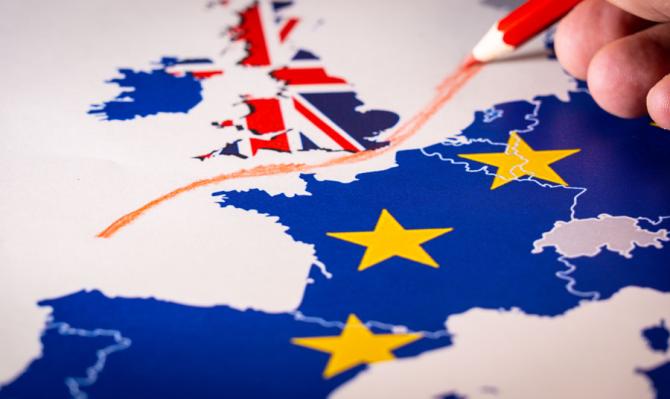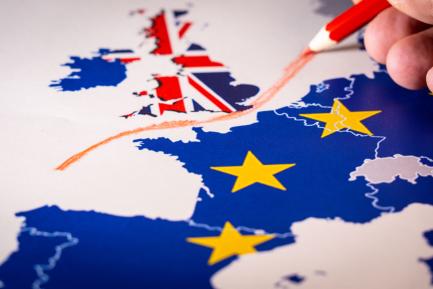The United Kingdom’s potential for Spain after Brexit
The uncertainty generated by Brexit is already affecting economic growth (mainly in the United Kingdom, and in particular in the form of a suspension of investment projects) and it could hinder business relations with Spain in the short term.

- In this article, we analyse the extent to which it will be more difficult for Spanish companies to establish relations for international expansion with the United Kingdom following Brexit.
- To this end, we use the CaixaBank Index for Business Internationalisation (CIBI), which classifies foreign countries according to the potential for internationalisation they offer for Spanish companies, and we analyse the impact of the four Brexit scenarios put forward by the Bank of England.
- The United Kingdom would remain high in the CIBI ranking five years after Brexit, although its score would be higher in the case of a soft Brexit thanks to the existence of a relatively comprehensive free trade agreement with the EU.
The uncertainty generated by Brexit is already affecting economic growth (mainly in the United Kingdom, and in particular in the form of a suspension of investment projects) and it could hinder business relations with Spain in the short term. However, the time frame being considered in this article extends beyond this, to the medium to long term (five years). Over this time frame, the relationship arising from whatever form Brexit takes will determine how difficult it will be for Spanish companies to establish internationalisation links with the United Kingdom, since these relationships are currently close (see first chart).1
- 1. For further details, see CaixaBank Research’s forthcoming working paper 02/19, which provides further details on the items summarised in this article.

In order to assess the impact of Brexit in this regard, we use the CaixaBank Index for Business Internationalisation (CIBI), which ranks countries according to the potential they offer Spanish companies for international expansion based on various key aspects. These include aspects such as accessibility to each country’s market, the ease of operating in each market, their commercial appeal, the financial and innovative environment, and their institutional and macroeconomic stability.2 In the case of the CIBI 2019, the United Kingdom holds the second position behind France, in the ranking of potential for internationalisation from among the 67 economies analysed. It is important to point out that the CIBI mainly gathers facts on the analysed country, rather than potential future developments. As such, the exercise we have undertaken seeks to capture how Brexit would affect the CIBI.
- 2. For further details on the CIBI, see the CaixaBank Index of Business Internationalisation - CIBI 2019 and the article «CIBI 2019: a compass to guide you in the foreign markets» in the MR09/2019.
For the purposes of our analysis, we relied on the four Brexit scenarios put forward by the Bank of England, and their estimated impact on a large number of economic and financial variables five years on (see table).3
- 3. See Bank of England (2018). «EU withdrawal scenarios and monetary and financial stability: A response to the House of Commons Treasury Committee».

To understand the implications of each of the four scenarios, it is important to take into account the current framework that the United Kingdom enjoys as a member of the EU, under which it participates in the free movement of goods, people, services and capital.
The first and least negative of the scenarios («close partnership») foresees a withdrawal agreed upon by both parties, with a two-year transition period, in which the United Kingdom and the EU would agree to maintain a close bilateral relationship. This would mean that certain barriers would apply to trade in services4 and the movement of capital. The second scenario («less close partnership») is very similar to the first, although in this case a less comprehensive trade agreement would be agreed. This would involve tariff barriers and customs controls, in addition to stricter regulatory barriers on the movement of capital, which would affect 50% of current flows. Despite this, both scenarios would be considered a soft Brexit, since they would take place following an agreement between London and Brussels.
The two remaining scenarios envisage a no-deal withdrawal (hard Brexit), after which the trading relationship between the United Kingdom and the EU would be governed by World Trade Organization rules (i.e. tariffs, customs controls and non-tariff barriers would apply to trade in goods and services, etc.). Under these scenarios, there would be no transition period prior to the new trading framework coming into force, which would cause serious delays at customs, among other problems. The difference between these two scenarios is that, unlike in the second one («disorderly» scenario), in the first one («disruptive» scenario) the United Kingdom would maintain its trade agreements with third-party countries (i.e. those currently in place as an EU Member State).
- 4. In particular, the financial services sector would lose its passport right to operate.
In all scenarios, the United Kingdom would continue to enjoy an advantageous position in the CIBI ranking. That is, five years after Brexit, it would remain an attractive country for Spanish companies looking to expand internationally. Specifically, it would remain in second position in the CIBI ranking in the two soft-Brexit scenarios, and would drop down to fourth position in the two hard-Brexit scenarios. The reason for it remaining among the top positions is that the agreement over the United Kingdom’s withdrawal from the EU will not significantly affect the strong investment ties that connect it to Spain, nor the advanced British legal and administrative framework, nor its well-prepared labour force, among other aspects that are relevant for internationalisation. In fact, the United Kingdom would not be far from the position currently held in the CIBI 2019 ranking by the US: an advanced country, which is also Anglo-Saxon and does not form part of the EU, and which is geographically farther away than the United Kingdom.
The main differentiating factor between the CIBI score in the first two scenarios (soft Brexit) compared to that in the second two (hard Brexit) is the existence or non-existence of a relatively comprehensive free trade agreement with the EU, since such an agreement is a key factor that companies assess when deciding to establish trade, investment or any other kind of relations with a foreign country. In particular, this factor, which is largely reflected in the CIBI’s «Accessibility» pillar, accounts for more than half of the United Kingdom’s fall in the index in the event of a hard Brexit. The other half of the decline is driven by other factors, such as the loss of purchasing power among British consumers due to a weaker pound against the euro, as a result of a worse macroeconomic situation than that foreseen in the case of a soft Brexit.

Thus, this exercise shows how, in the medium term, certainty over the new framework of relations, a solid legal and institutional framework and the trade and economic relations in place should facilitate a return to a certain degree of normality, in which the United Kingdom would remain a preferential partner for Spanish companies. That said, once again it is important to emphasise that this does not prevent the uncertainty surrounding the United Kingdom’s withdrawal from the EU from potentially posing a significant obstruction for Spain’s internationalisation relations with the United Kingdom during that process.
- 1. For further details, see CaixaBank Research’s forthcoming working paper 02/19, which provides further details on the items summarised in this article.
- 2. For further details on the CIBI, see the CaixaBank Index of Business Internationalisation - CIBI 2019 and the article «CIBI 2019: a compass to guide you in the foreign markets» in the MR09/2019.
- 3. See Bank of England (2018). «EU withdrawal scenarios and monetary and financial stability: A response to the House of Commons Treasury Committee».
- 4. In particular, the financial services sector would lose its passport right to operate.





